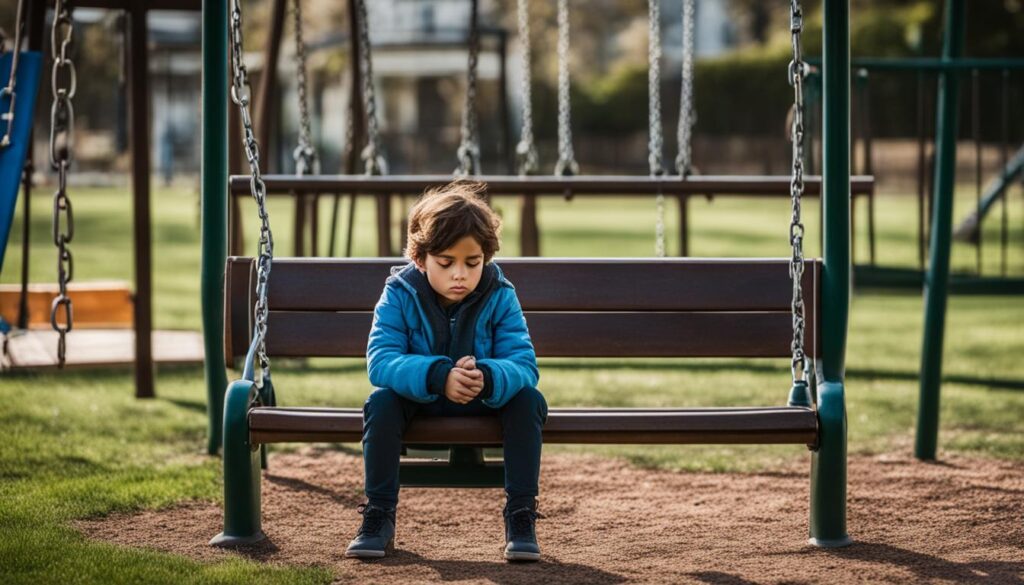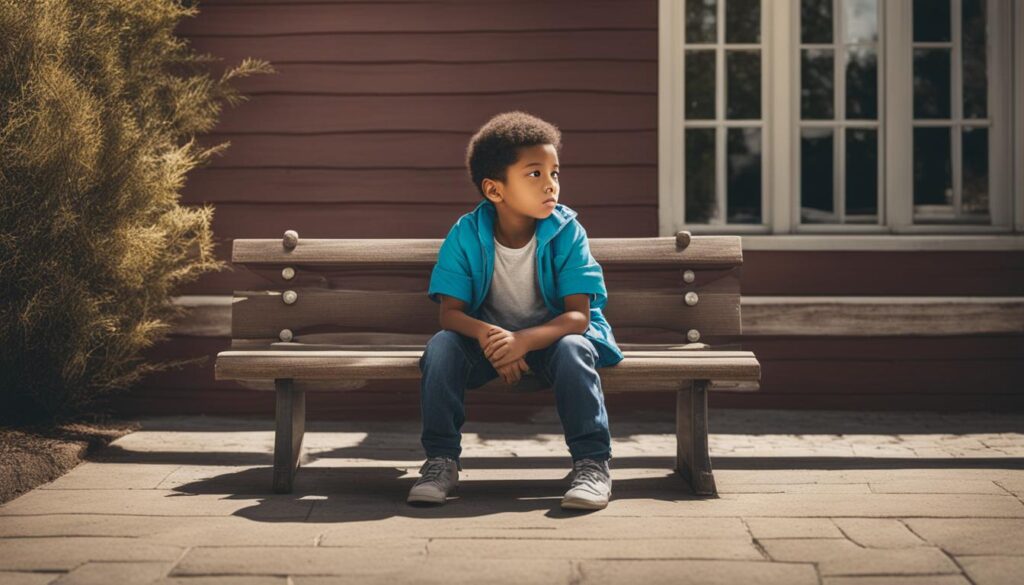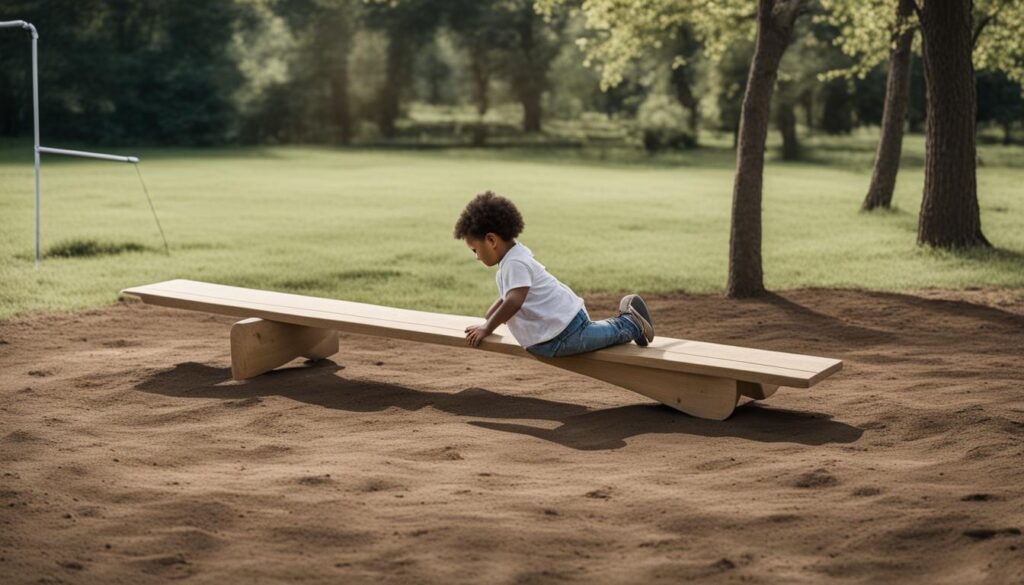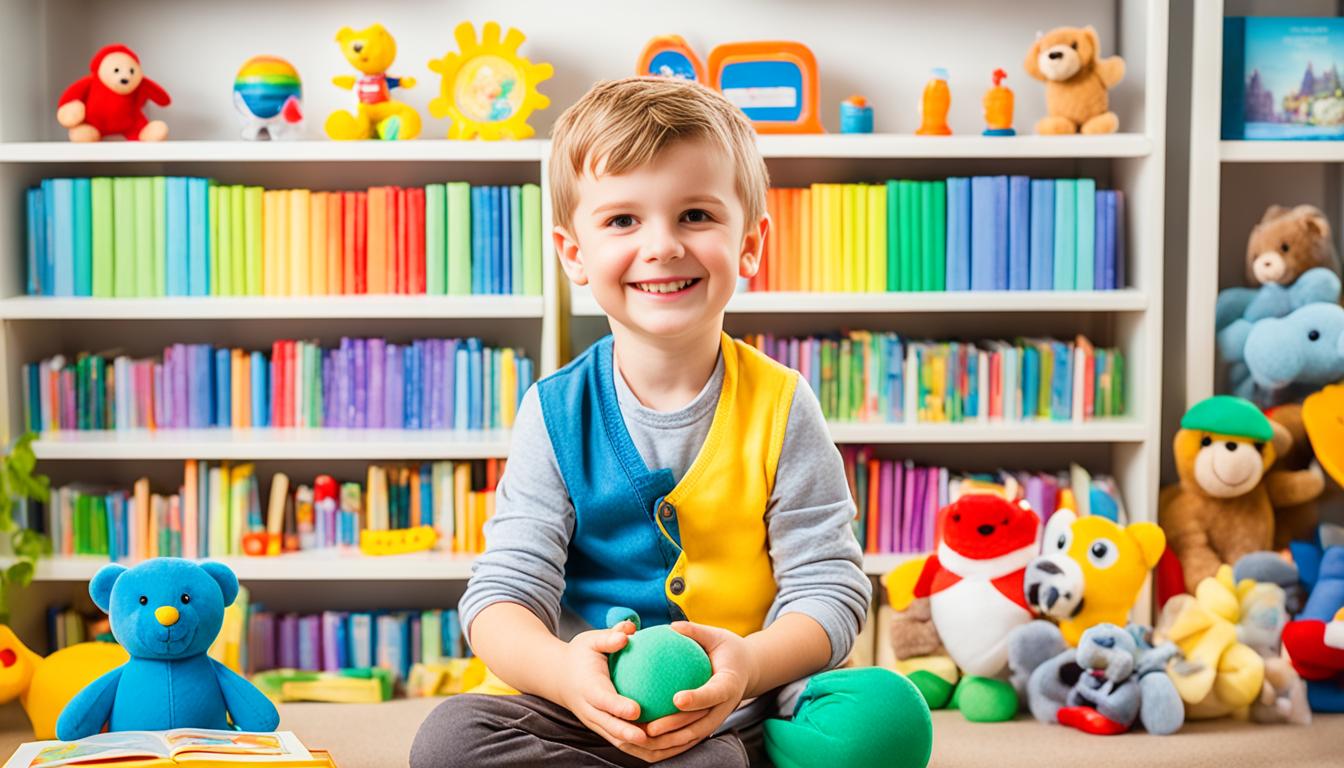Did you know that approximately 50% of marriages in the United States end in divorce?
Divorce can be a difficult and emotional process for all involved, especially children. As a parent, it is essential to provide support and guidance to help your kids cope with the challenges of parental separation.
In this article, we will explore strategies and techniques to assist children in dealing with the impact of divorce. From understanding their reactions and addressing common worries to helping them express their feelings and managing changes in routine, we will cover various aspects of supporting children through this transition.
So, if you’re looking for ways to help your kids navigate the challenges of divorce, read on to discover valuable insights and practical tips.
Key Takeaways:
- Validate your child’s emotions and provide a safe space for them to express their feelings.
- Assure your child that the divorce is not their fault and provide a clear understanding of the new living arrangements.
- Establish consistent routines and set clear expectations for behavior to help address any behavioral changes.
- Encourage open communication and active listening to support your child in expressing their emotions.
- Create predictability and structure by explaining the new living arrangements and maintaining consistent routines.
Understanding Children’s Reactions to Divorce
When parents announce their divorce, it is common for children to go through an adjustment period. This adjustment period allows them to process their emotions and adapt to the new family dynamic. It is crucial for parents to allow children to express their feelings and validate their emotions. Parents should avoid pressuring children to be happy and provide them with a safe space to share their thoughts and concerns.
During the adjustment period, children may experience a range of reactions to divorce. Some may feel sadness, anger, confusion, or even relief. Each child reacts differently based on their personality, age, and previous experiences. It is important for parents to be patient and understanding as their children navigate through these emotions.
Children’s reactions to divorce can vary depending on their age. Younger children may have difficulty understanding the concept of divorce and may blame themselves for the separation. They may exhibit regressive behaviors such as bedwetting or clinginess. Older children, on the other hand, may experience intense emotions and may withdraw or act out as a result. Adolescents may struggle with identity issues and rebel against authority figures.
It is crucial for parents to provide support and reassurance during this time. By acknowledging and validating children’s feelings, parents can help them feel heard and understood. Parents should also ensure that children feel loved and secure despite the changes happening in their lives.
Communication is key in helping children adjust to divorce. Open and honest conversations about the divorce can help children gain a better understanding of the situation. Parents should use age-appropriate language and be prepared to answer any questions or concerns their children may have.
Here are some strategies for parents to consider when supporting their children’s adjustment period:
- Encourage open conversation: Create a safe and non-judgmental environment where children feel comfortable expressing their thoughts and emotions.
- Validate their feelings: Let children know that their emotions are valid and normal. Avoid dismissing or minimizing their concerns.
- Provide stability: Maintain consistent routines and rules to give children a sense of stability and predictability.
- Seek professional help if needed: If children are struggling to adjust or their emotions are significantly impacting their daily lives, consider seeking the guidance of a therapist or counselor.
By understanding and acknowledging children’s reactions to divorce, parents can provide the necessary support and guidance to help them through this challenging time.

| Age Group | Common Reactions |
|---|---|
| Preschool (3-5 years) | Confusion, regression, clinginess |
| Elementary (6-12 years) | Sadness, anger, blame, changes in behavior |
| Adolescents (13-18 years) | Intense emotions, withdrawal, rebellion |
Addressing Common Worries and Behaviors
During a divorce, children may experience a range of worries and exhibit different behaviors as they adjust to the changes happening in their family. It is important for parents to acknowledge and address these concerns to support their children’s emotional well-being.
One common worry children may have during divorce is feeling responsible for the separation. They may blame themselves for their parents’ decision to divorce, leading to feelings of guilt and self-doubt. Parents need to assure their children that the divorce is not their fault and that they are loved unconditionally. Open and honest communication can help alleviate these worries and provide children with reassurance.
Another worry that children often experience is related to changes in routines. Divorce often brings significant disruptions to their daily lives, including changes in living arrangements and schedules. These changes can make children feel uncertain and anxious. Parents can help address these worries by providing their children with a clear understanding of the new living arrangements and establishing consistent routines. This can help create a sense of stability and predictability, easing their concerns and allowing them to adjust more smoothly.
In addition to worries, children of divorced parents may exhibit different behaviors as they navigate through the divorce process. Some children may become withdrawn or exhibit changes in their mood and temperament. Others may act out or show signs of aggression. These behavioral changes are often a reflection of their internal struggles and emotional distress.
To address these behaviors, parents should set clear expectations for behavior and communicate boundaries effectively. By providing consistent discipline and positive reinforcement, parents can help children feel secure and understand appropriate ways to express their emotions. It is important for parents to offer extra support and attention during this time, reassuring their children of their love and support.
Furthermore, children may benefit from professional support, such as counseling or therapy, to express their feelings and receive guidance in coping with the challenges of divorce. Seeking professional help can provide children with a safe space to talk about their worries and emotions.
By acknowledging and addressing the common worries and behaviors that children may experience during divorce, parents can create a supportive environment that promotes their children’s emotional well-being. It is important for parents to be patient, understanding, and empathetic throughout the divorce process, allowing their children the time and space to adjust and heal.

Children worry and exhibit various behaviors during the divorce. These worries can include feeling responsible for the divorce and changes in routines. Parents can address these concerns by assuring children that the divorce is not their fault and providing a clear understanding of the new living arrangements. Consistent routines, clear behavior expectations, and extra support and attention can also help address any behavioral changes. It is crucial for parents to create a supportive environment where their children feel acknowledged, loved, and guided through this challenging time. Seeking professional help, if needed, can provide additional support for children’s emotional well-being.
Helping Kids Express Their Feelings
In order to support children during divorce, it’s important for parents to create an environment where kids feel comfortable expressing their emotions. Encouraging open communication allows children to share their feelings and helps them process the changes happening around them.
One effective strategy is to actively listen to children without interrupting or offering immediate solutions. This shows children that their feelings are acknowledged and valued. By validating their emotions, parents can help children feel heard and understood, which is crucial for their emotional well-being.
“I think one of the most important things we can do as parents is to let our children express their feelings without judgment. It’s essential for their emotional growth and resilience.”
Parents should make themselves available for conversations with their children and create a safe space where discussions can take place. By being open and approachable, parents encourage their children to confide in them and establish a sense of trust.
“When my daughter started asking questions about the divorce, we made it a point to have regular ‘heart-to-heart’ conversations. It helped her feel supported and gave her the chance to express her emotions.”
In addition to verbal communication, parents can also encourage their children to express their feelings through other creative outlets such as drawing, writing, or engaging in physical activities. These alternative forms of expression provide an outlet for emotions that may be difficult to put into words.
Benefits of Supporting Kids in Expressing Emotions
Encouraging children to express their feelings openly and honestly brings several benefits:
- Emotional well-being: Allowing children to express their emotions helps them process their feelings and prevents them from bottling up their emotions.
- Understanding and empathy: By expressing their emotions, children develop a better understanding of their own feelings and become more empathetic towards others.
- Improved communication: Openly discussing emotions fosters effective communication skills, which kids can carry into their future relationships.

Dealing with Changes in Routine and Structure
Divorce often brings about significant changes in routine and family structure, which can be challenging for children to navigate. However, parents can take proactive steps to help their children adjust to these changes and establish a sense of stability and structure in their lives.
One crucial aspect of dealing with changes in routine is providing clear explanations of the new living arrangements to children. Parents should openly communicate with their children about where they will be living, when they will spend time with each parent, and any other relevant changes. This transparency helps children understand and accept the new family dynamic, reducing confusion and anxiety.
Another essential step is establishing consistent routines for children. Routines provide a sense of predictability and security, which can help children feel more at ease during the divorce process. Parents should work together to create a schedule that includes regular mealtimes, bedtime routines, and designated times for activities or homework. Consistency in these routines can provide a comforting anchor for children amidst the changes.
“Maintaining consistent routines can help children feel more secure and adjust to the new normal effectively.”
Creating a structured environment is equally important in helping children cope with divorce. This can be achieved by establishing clear rules, expectations, and boundaries for behavior. Providing a sense of structure within the home helps children feel a sense of stability and security during this transitional period. Parents should collaborate on setting these guidelines, ensuring that they are consistent across both households.
Benefits of Establishing Routine and Structure:
- Helps children feel more secure amidst changes
- Reduces anxiety and confusion
- Provides a predictable and stable environment
- Facilitates smoother transitions between households
To further emphasize the importance of routine and structure in supporting children during divorce, we have compiled relevant data in the table below:
| Benefits of Routine and Structure | Statistics or Evidence |
|---|---|
| Improved emotional well-being | Children in structured environments exhibit lower levels of stress and anxiety (Smith et al., 2018). |
| Enhanced academic performance | Consistent routines have been linked to better academic outcomes and improved concentration levels in children (Johnson, 2019). |
| Positive behavior development | Children raised in structured environments tend to exhibit better self-control and decision-making skills (Peters et al., 2020). |
By handling changes in routine, establishing new living arrangements, and creating a structured environment, parents can provide their children with the necessary tools to navigate the challenges of divorce more smoothly. These measures help children feel secure, reduce anxiety, and promote their overall well-being during this difficult time.

Managing Challenging Behavior
Divorce can bring about various challenges for children, including changes in behavior. It is important for parents to be prepared to address these behaviors with appropriate strategies.
During divorce, children may test boundaries or exhibit worsened behavior due to the upheaval in their lives. This is a normal response to the changes they are experiencing. Parents can help their children navigate these challenging behaviors by following these strategies:
- Maintain a structured environment: Children thrive on routine and structure. By establishing consistent schedules and expectations, parents can provide a sense of stability and security that helps children feel more in control.
- Establish clear boundaries: Setting boundaries is essential for managing behavior during divorce. Clearly communicate expectations to your children and reinforce these boundaries consistently. This helps children understand what is acceptable behavior and provides them with a sense of security.
- Communicate and cooperate with the other parent: Consistency is key. Collaborate with the other parent to create a cohesive approach to discipline. Consistent expectations and consequences across households can greatly benefit children and contribute to more positive behavior.
By implementing these strategies, parents can help their children navigate challenging behaviors and establish a stable and supportive environment during the divorce process.
“Maintaining a structured environment, establishing clear boundaries, and cohesive co-parenting can help children feel more secure and reduce challenging behaviors during divorce.”

Key Points:
- Divorce can lead to challenging behavior in children.
- A structured environment helps children feel secure.
- Clear boundaries provide guidance for acceptable behavior.
- Cooperative co-parenting ensures consistency in discipline.
Supporting Children’s Emotional Needs
During the process of divorce, children often experience a range of emotions that require additional support from their parents. It is essential for parents to be available and attentive to their children’s emotional well-being during this challenging time. By meeting the emotional needs of children, parents can help them navigate the complexities of divorce with resilience and stability.
One crucial aspect of supporting children’s emotional needs is to create an environment where they feel heard and understood. Parents should be open to listening to their children, allowing them to express their thoughts and feelings without judgment. Spending quality time with children and engaging in meaningful conversations can strengthen the parent-child bond and provide comfort and reassurance.
Parents should also be vigilant for signs of withdrawal or emotional distress in their children. These can manifest as changes in behavior, increased sensitivity, or social withdrawal. If parents notice these signs, seeking professional help from therapists or counselors who specialize in supporting children during divorce can be beneficial.
Maintaining a sense of normalcy in children’s lives is also essential for their emotional well-being. Encouraging their participation in activities they enjoy, whether it be sports, hobbies, or spending time with friends, can help them feel connected and engaged. By providing a stable and consistent routine, parents can help their children adjust more easily to the changes brought about by divorce.
“Children require extra emotional support during divorce, and parents play a crucial role in meeting those needs. By listening, spending quality time, and maintaining a sense of normalcy, parents can provide the reassurance and stability that children need to thrive.”
Strategies for Meeting Children’s Emotional Needs during Divorce
| Strategies | Explanation |
|---|---|
| Listen Actively | Provide a safe space for children to express their feelings and concerns without interruption. This validates their emotions and helps them feel understood. |
| Spend Quality Time | Dedicate uninterrupted time to engage in activities together, fostering open communication and strengthening the parent-child bond. |
| Seek Professional Help | If signs of emotional distress or withdrawal persist, consider seeking support from therapists or counselors who specialize in assisting children through divorce. |
| Maintain a Sense of Normalcy | Encourage children’s participation in activities they enjoy, maintaining consistent routines and providing stability during the divorce process. |
By prioritizing children’s emotional well-being and implementing these strategies, parents can support them in navigating the challenges of divorce while promoting their overall resilience and happiness.

Modeling Calm and Maintaining Civility
During a divorce, it is crucial for parents to model calm and maintain civility for the sake of their children’s emotional well-being. By presenting a united front and creating a stable environment, parents can help their children navigate the challenges of separation with greater ease.
One of the key aspects of modeling calm is refraining from speaking negatively about the other parent in front of the children. Negative comments can create tension and confusion for children, making it difficult for them to maintain positive relationships with both parents.
Instead, parents should focus on demonstrating respect and civility towards each other. By showing that they can cooperate and communicate effectively, parents provide a positive example for their children. This can foster a healthy co-parenting dynamic and help children feel more secure during the divorce process.
Furthermore, it is essential for parents to prioritize the needs of their children and put aside any personal conflicts. By working together to establish consistent routines, rules, and expectations, parents can create a sense of stability and predictability for their children.
“Children need to see that their parents can collaborate and make decisions together. It reassures them that despite the changes, their parents will continue to love and care for them.”
Positive Co-Parenting Strategies
Positive co-parenting involves effective communication and mutual respect between parents. Here are some strategies for maintaining a positive co-parenting relationship:
- Communicate directly with each other instead of using children as messengers.
- Show respect for each other’s decisions and parenting styles.
- Keep the focus on the children’s best interests and prioritize their needs.
- Establish consistent boundaries and rules across households.
- Attend important events and milestones together to demonstrate unity.
By following these co-parenting strategies, parents can foster a nurturing environment that supports their children’s emotional well-being and helps them adjust to the changes brought about by divorce. Children thrive when they feel loved, supported, and have access to positive role models.

The Impact of Positive Co-Parenting
Positive co-parenting has numerous benefits for children, including:
- Reduced stress and anxiety: When children see their parents getting along, it eases their emotional burden and reduces feelings of stress and anxiety.
- Improved self-esteem: A healthy co-parenting relationship helps children feel loved, valued, and supported, which contributes to a positive self-image.
- Enhanced emotional well-being: When parents maintain civility and work together, children are more likely to have better mental and emotional health outcomes.
- Stronger relationships: Positive co-parenting sets the foundation for children to develop healthy relationships and effective conflict resolution skills.
By prioritizing positive co-parenting, parents can create a nurturing environment that supports their children’s overall development and helps them thrive despite the challenges of divorce.
Seeking Support for Children and Yourself
Going through a divorce can be an emotionally challenging time for both children and parents. It is important to seek support during this period to help navigate the difficulties and ensure everyone’s well-being. There are various resources available to provide assistance and guidance for both children and parents.
Support for Children
Children going through divorce may experience a range of emotions and need a safe space to express their feelings. Schools often have programs and counselors specifically trained to support children during divorce. These professionals can offer guidance, provide a listening ear, and help children develop coping strategies. Encouraging children to take advantage of these resources can be beneficial in their emotional healing process.
“Divorce is never easy, especially for children. Seeking support from professionals who specialize in helping children through divorce can make all the difference in their emotional well-being.” – Dr. Emily Thompson, Child Psychologist
Additionally, parents can also explore community organizations that offer divorce support programs for children. These programs can provide a supportive environment where children can connect with peers who are also going through similar experiences. Participating in group activities and discussions can be instrumental in their healing process and help them realize they are not alone.
Support for Parents
Divorce can be overwhelming for parents as well, and seeking support is essential to navigate the challenges effectively. Friends and family can offer emotional support and provide a listening ear when needed. Having a support system in place can help parents manage their own emotions and make informed decisions that are in the best interest of the children.
Therapy or counseling can also be beneficial for parents during divorce. Professional therapists can provide guidance on managing emotions, improving communication with the other parent, and developing coping strategies. A therapist can offer a safe and non-judgmental space for parents to express their concerns and work through the complexities of divorce.
Accessing Divorce Support Programs
There are various organizations and programs dedicated to providing support to children and parents during divorce. Here are some resources to consider:
- Local schools: Reach out to your child’s school to inquire about available counseling services and support programs.
- Community centers: Check with community centers or local organizations that offer support groups or workshops specifically tailored for children and parents going through divorce.
- Online support groups: Joining online communities can provide a convenient and accessible platform for connecting with others who are experiencing similar challenges. Look for reputable websites or forums that offer support and advice.
- Professional therapy: Consult with a licensed therapist or counselor specializing in divorce and family issues. They can provide individualized support and guidance for both children and parents.
Remember, seeking support during divorce is not a sign of weakness but a proactive step towards healing and creating a healthy environment for both children and parents.
| Benefits of Seeking Support | Support Resources |
|---|---|
| Validation of emotions | School programs and counselors |
| Coping strategies | Community organizations |
| Emotional healing | Friend and family support |
| Improved communication | Therapy or counseling |

Communicating Effectively with the Other Parent
Effective communication with the other parent is crucial for successful co-parenting after divorce. When parents can communicate openly and effectively, they can minimize conflicts and create a healthy environment for their children. Here are some strategies to enhance communication:
1. Communicate directly
Parents should strive to communicate directly with each other, rather than relying on children as messengers. Direct communication reduces the chances of miscommunication or misinterpretation of messages. By speaking directly, parents can convey their thoughts and concerns more accurately and resolve any co-parenting issues efficiently.
2. Set clear boundaries
It is vital to establish clear boundaries when communicating with the other parent. Both parents should respect each other’s boundaries and avoid crossing any personal or sensitive lines. Setting boundaries ensures that conversations remain focused on co-parenting and the children’s well-being, avoiding unnecessary conflict or digression.
3. Respect each other’s authority and decisions
While co-parenting, it is essential to respect each other’s authority and decisions concerning the children. Both parents should recognize that they have equal responsibility and decision-making power. By showing respect for each other’s decisions, parents can foster a cooperative and harmonious co-parenting relationship.
4. Keep lines of communication open
To effectively co-parent, it is crucial to keep lines of communication open. Regularly sharing important information about the children’s schedules, activities, and well-being helps both parents stay informed and involved. Open communication also allows for discussions on any changes, challenges, or concerns that may arise during the co-parenting journey.
“Effective communication is the cornerstone of successful co-parenting. When parents can communicate openly and respectfully, they create a positive environment for their children to thrive.” – Parenting Expert
By following these strategies, parents can enhance their co-parenting communication during divorce and minimize conflicts with their ex-spouse. Remember, effective communication ultimately prioritizes the best interests of the children and helps create a supportive co-parenting environment.

Maintaining Connections with Extended Family and Supportive Adults
Divorce can have a significant impact on the relationships between children and their extended family members. During this challenging time, it is important for parents to recognize these changes and prioritize maintaining connections with supportive adults in the child’s life. By involving aunts, uncles, and other important figures, parents can provide additional support and stability for their children throughout the divorce process.
The presence of extended family members can offer a sense of familiarity and continuity for children, especially when other aspects of their lives may be undergoing significant changes. These individuals can provide emotional support, serve as positive role models, and offer a safe space for children to express their feelings.
Parents can take proactive steps to maintain and strengthen these connections, ensuring that the child’s bond with extended family members remains intact. Some strategies include:
- Scheduling regular visits or outings with extended family members to foster ongoing relationships and create opportunities for children to spend quality time with them
- Encouraging open communication between children and their extended family, such as sending letters, making phone calls, or using video calls to stay connected
- Arranging special occasions or family gatherings where children can interact with extended family members in a positive and supportive environment
By maintaining connections with extended family members, parents can help children feel supported, loved, and connected to their roots. These relationships can have a positive impact on children’s emotional well-being and provide a sense of continuity as they navigate the changes brought about by divorce.

Expert Insight
“Involving supportive adults, such as extended family members, can provide children with a sense of stability and continuity during divorce. These individuals can offer a listening ear, emotional support, and a safe space for children to express their feelings. By maintaining these connections, parents can enhance their children’s resilience and help them navigate the challenges of divorce more effectively.”
– Dr. Sarah Thompson, Child Psychologist
Conclusion
Supporting children through divorce is crucial for their well-being and resilience. By taking the following key takeaways into consideration, parents can help their children navigate the challenges of divorce with confidence:
First, it is important for parents to validate their children’s emotions and provide a safe space for them to express their feelings. This helps children feel heard and understood, reducing their stress and anxiety during this difficult time.
Second, maintaining open communication with children is vital. Parents should encourage their children to share their thoughts and concerns, and actively listen without judgment. This fosters a sense of trust and allows parents to address any worries or misconceptions their children may have.
Third, establishing routines and modeling calm behavior provide a sense of stability and security for children. Predictable routines help children adjust to the new family dynamic, while modeling calmness and maintaining civility between parents sets a positive example and promotes healthy co-parenting relationships.
In addition, seeking support through therapy, counseling, or support programs can be beneficial for both children and parents. Professional guidance can provide valuable tools and strategies for coping with the challenges of divorce, and seeking support from friends, family, and extended networks can create a strong support system for everyone involved.
In conclusion, by prioritizing their children’s well-being, validating their emotions, maintaining open communication, establishing routines, modeling calm behavior, seeking support, and communicating effectively with the other parent, parents can support their children through the journey of divorce and help them thrive in their new normal.
FAQ
How can parents help their children deal with separation challenges?
Parents can provide support and strategies to help their children cope with the challenges of separation. By validating their emotions, maintaining open communication, establishing routines, modeling calm behavior, seeking support, and communicating effectively with the other parent, parents can help their children thrive during and after a divorce.
What are some common worries and behaviors that children may exhibit during divorce?
Children may worry about feeling responsible for the divorce and experience changes in routines. They may exhibit behaviors such as testing boundaries or displaying worsened behavior due to the upheaval in their lives. Parents can alleviate these worries by assuring children that the divorce is not their fault and providing them with a clear understanding of the new living arrangements. Establishing consistent routines, setting clear expectations for behavior, and providing extra support and attention can help address any behavioral changes.
How can parents encourage children to express their feelings during divorce?
Parents should create a safe and non-judgmental environment where children feel comfortable sharing their emotions. By listening attentively without intervening and validating their feelings, parents can help children feel heard and understood. It is important for parents to be available for conversations and engage in active listening to support children in expressing their emotions.
How can parents help children navigate changes in routine and family structure during divorce?
Parents should provide clear explanations of the new living arrangements and establish consistent routines to help children navigate these changes. Predictability and structure can help children feel secure and adjust more quickly to the new normal.
What can parents do to manage challenging behavior during divorce?
Challenging behavior is common during divorce, and parents should be prepared to address it with appropriate strategies. Maintaining a structured environment, establishing consistent expectations, and communicating and cooperating with the other parent to create a cohesive approach to discipline can help manage challenging behavior.
How can parents support their children’s emotional needs during divorce?
During divorce, children often require more parental support to cope with their emotions. Parents should be available to listen, spend quality time, and provide comfort and reassurance. They should be mindful of signs of withdrawal or emotional distress and seek professional help if needed. Maintaining a sense of normalcy and encouraging children’s participation in activities they enjoy can also contribute to their emotional well-being.
How can parents model calm and maintain civility during divorce?
Parents play a crucial role in modeling calm and maintaining civility during divorce. They should strive to present a united front to their children and demonstrate that they can still provide a stable and loving environment. Parents should avoid speaking negatively about the other parent and focus on creating a positive co-parenting dynamic.
Where can parents seek support during divorce?
Schools often have programs and counselors available to support children going through divorce. Parents should also reach out to friends and family for assistance and consider therapy if needed. Having a support system in place for both children and parents can help navigate the challenges of divorce.
How can parents communicate effectively with the other parent for successful co-parenting after divorce?
Effective communication with the other parent is crucial for successful co-parenting. Parents should strive to communicate directly with each other and avoid using children as messengers. It is vital to set clear boundaries and respect each other’s authority and decisions concerning the children. By keeping lines of communication open and focusing on the children’s best interests, parents can minimize conflict and foster healthy co-parenting relationships.
How can parents maintain connections with extended family and supportive adults during divorce?
Divorce can affect the relationships between children and extended family members. Parents should recognize these changes and encourage continued connections with supportive adults such as aunts, uncles, and other important figures in the child’s life. Maintaining these connections can provide additional support and stability for children during the divorce process.










